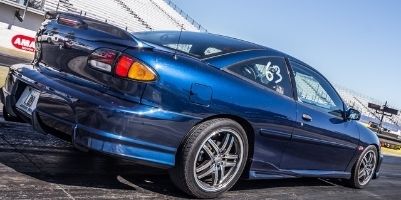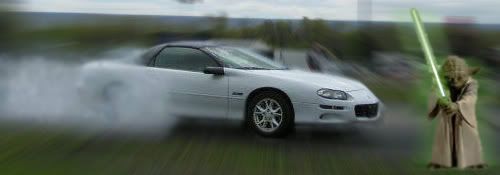I am looking for someone's experience or different opinions about running race gas on a stock circle track car. We have 2 cars we run at different tracks and was wondering if there would be an advantage to running race gas on a basically stock motor even though it is turning high rpms over normal 91 octane pump gas. We have a 93 2.2 5 spd with a CIA and Hedder and the other car is a 97 2.2 5spd both stock engines. Both cars are competetive currently but would the race gas give us more bang for our buck or would it be a waste. Thanks for your opinions.
Without tuning it is not going to help.
 FU Tuning
FU Tuning
I could be wrong but I was under the impression that race fuel won't help you out unless you need it (ie 91 octane isn't enough for the power your running). I know the guy that tuned my car runs his 2.2 acura on 91 octane and has no problem with his 450whp. Mind you he runs a tune for race fuel that he is able to push out 600whp.

That was my thoughts that without a tune the 91 octane would be sufficient. Thanks..
I mean you could weld some extra material into the combustion chambers to add some compression and then need race gas to prevent detonation and get some extra ponies.... But that would be against the rules...
1994 Saturn SL2 Home Coming Edition: backup car
2002 Chevy Cavalier LS Sport Coupe: In a Junk Yard
1995 Mazda Miata R-package Class=STR
Sponsored by:
Kronos Performance
WPI Class of '12 Mechanical Engineering
WPI SAE Risk and Sustainability Management Officer
I ran 108 race gas and 91 pump gas 50/50 in my 91 2.3 lo the car was .2 a lap faster on a 3/8 mile paved track
Mike Golding wrote:I ran 108 race gas and 91 pump gas 50/50 in my 91 2.3 lo the car was .2 a lap faster on a 3/8 mile paved track
lol
that .2 seconds can attributed to anything.

Im a Xbox 360 fanboy...and damn proud of it!!
we kept good records on everything we do to the cars and only make one change at a time buffed tires are good for .3 and soaking tires another .2 and longer tire life
The point is, if the breeze was blowing a different direction it could make up .2. if you take a turn 1mph faster it could make up the difference.... race gas is a waste unless you are really tuned for it, and REALLY needing it.

We run 90 octane non-ethanol in most of the 4 cylinder cars at our track and they all seem to work better with it than the 93 octane ethanol gas they had before...
Octane rating is a measure of how slowly the particular grade of fuel burns, and thus, how resistant it is to detonation or pre-ignition. If you're not seeing any knock or timing retard with 91, race gas isn't going to do anything for you. Hell, even 91 vs 87 more likely than not isn't going to help you on a stock motor.
Arrival Blue 04 LS Sport
Eco
Turbo
Megasquirt
'Nuff said

JerseyJayLN2 (Scarab) wrote:Octane rating is a measure of how slowly the particular grade of fuel burns, and thus, how resistant it is to detonation or pre-ignition. If you're not seeing any knock or timing retard with 91, race gas isn't going to do anything for you. Hell, even 91 vs 87 more likely than not isn't going to help you on a stock motor.
Exactly, I think some people have the misconception that higher octane causes a bigger explosion in the chambers, since it is rated higher that it is somehow more powerful, when in reality it basically is just harder to ignite to prevent detonation, so lower octane is faster burning and can ignite before TDC, detonation, while higher octane would be more stable in the same situation. Usually only high compression or boosted engines see a benefit and that is just to keep you from having detonation.
Bob Johnson wrote:JerseyJayLN2 (Scarab) wrote:Octane rating is a measure of how slowly the particular grade of fuel burns, and thus, how resistant it is to detonation or pre-ignition. If you're not seeing any knock or timing retard with 91, race gas isn't going to do anything for you. Hell, even 91 vs 87 more likely than not isn't going to help you on a stock motor.
Exactly, I think some people have the misconception that higher octane causes a bigger explosion in the chambers, since it is rated higher that it is somehow more powerful, when in reality it basically is just harder to ignite to prevent detonation, so lower octane is faster burning and can ignite before TDC, detonation, while higher octane would be more stable in the same situation. Usually only high compression or boosted engines see a benefit and that is just to keep you from having detonation.
Yes, gasoline is pretty much gasoline in how fast it burns. The desired effect of increased octane is to enable the fuel-air mixture the ability to absorb more heat before self ignition, aka detonation happens.
Interesting fun fact; I think it was Honda, way back in the 60's, who built a 50cc, 4 cylinder, 4 valve per cylinder motorcycle. IIRC they found that they could make more power by running lower octane fuel, not because it contained more energy but because it could be fired soon enough to completely burn the fuel. This was because of the high rpm it was turning, roughly 20k. I think it made about 20hp.
thanks,
dennis
Bob Johnson wrote:JerseyJayLN2 (Scarab) wrote:Octane rating is a measure of how slowly the particular grade of fuel burns, and thus, how resistant it is to detonation or pre-ignition. If you're not seeing any knock or timing retard with 91, race gas isn't going to do anything for you. Hell, even 91 vs 87 more likely than not isn't going to help you on a stock motor.
Exactly, I think some people have the misconception that higher octane causes a bigger explosion in the chambers, since it is rated higher that it is somehow more powerful, when in reality it basically is just harder to ignite to prevent detonation, so lower octane is faster burning and can ignite before TDC, detonation, while higher octane would be more stable in the same situation. Usually only high compression or boosted engines see a benefit and that is just to keep you from having detonation.
not disagreeing with you here but just wanted to point out the spark is fired prior to TDC, Spark advance is degrees before TDC. detonation is ignition prior to spark. But yeah lots of misinformation and incorrect assumptions about higher octane fuel.
also, OP, i would imagine you wouldn't run a cat but some race gas can be leaded and this plugs the cat. but prob a non-issue.

94 octane + 15* timing (safe street setup / 12 lbs boost) = 113mph trap speed
94 + 113 leaded + 19* timing + 115 mph trap speed (but a lot more traction issues)
Race gas will only help you if you can tune for it, if your not knocking with 87/91 octane, I wouldn't bother until you really start modding.







